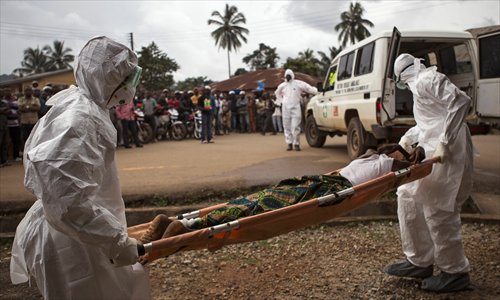Sierra Leone moves beyond Ebola
African country seeks intl support, cooperation

Healthcare workers load a man suspected of suffering from the Ebola virus onto an ambulance in Kenema, Sierra Leone. Photo: IC
Officials from Sierra Leone have pledged to halt Ebola infections in the wake of the fatal epidemic, both nationally and regionally, within the next 60 days.
"We believe that Ebola can be eradicated as quickly as possible," visiting Sierra Leone Foreign Minister Samura Kamara told the Global Times last week in London, adding that there are now more health centers, laboratories, hospitals and thousands of Ebola response workers.
"A significant part of the country has already achieved Ebola-free status," John Sisay, chief executive officer of Sierra Rutile Limited, told the Global Times, adding that the last few months had witnessed a steady drop in the infections.
However, even though Sierra Leone has made great strides in reducing the infection rate the battle appears to be a bumpy one as Vice President Samuel Sam-Sumana on Saturday quarantined himself after one of his bodyguards died from Ebola.
The latest World Health Organization data shows that two-thirds of the 99 cases in the week beginning February 16 were in Sierra Leone.
Many of the new cases were connected with maritime activities, and checks have been increased, according to BBC reports.
The year-long Ebola outbreak since May has killed more than 9,500 people across the three hardest-hit West African countries - Sierra Leone, Guinea and Liberia. After reaching its peak in November, the Ebola epidemic has begun to ebb.
Ebola struck and crippled a recovering Sierra Leone. Officials and businessmen are seizing every opportunity to normalize their country.
"We are not waiting until the Ebola threat ends, we are planning right now," Kamara said, adding that Sierra Leone is open for business, despite the challenges the country faces.
Healing the wounds
"The impact of Ebola has been quite significant, initially because of fear," Sisay told the Global Times, adding that most people did not understand what Ebola was.
"The fear did more damage to the economy than the actual disease itself," he added.
With international assistance, the coastal country of 6 million people is fighting against the damage brought by Ebola. The virus has already killed more than 3,000 people.
It had a devastating effect: schools and businesses were closed, and flights to Sierra Leone were suspended. Social cohesion was undermined, and the country's economy was severely compromised.
The annual GDP growth projections made in June 2014 was revised from 11.3 to 4.0 percent. The Agenda for Prosperity, the country's third Growth and Poverty Reduction Strategy, was halted soon after it was launched.
In fact, this is not the first time that Sierra Leone encountered such a dreadful crisis. From 1991 to 2002, the country experienced a decade-long civil war.
Sierra Leone showed great resilience during the civil war. The country's economic and political performance during the post-war recovery had defied expectations. By improving infrastructure and strengthening good governance, the nation enjoyed strong economic growth, averaging 6 percent annually.
One of Africa's fastest growing economies, pre-Ebola Sierra Leone was seen as a post-conflict success story. The nation was lauded early last year by the United Nations Security Council as a model of post-war recovery.
Foreign Minister Kamara said that Sierra Leone would use the lessons learned in post-civil war reconstruction to counter the new challenges posed by Ebola.
The government has designed a Post-Ebola Recovery Plan to stimulate growth to pre-Ebola levels, and ultimately surpass those levels.
In preparation for an international conference in March in Brussels, the Post-Ebola Recovery Plan will come in two phases - first and more urgent is to totally eradicate Ebola; and second, to achieve economic recovery, Kamara explained. He added that most African countries need to strike a balance between growth and promoting human development.
China part of the story
"We are very grateful that China built the first permanent lab for disease control in Sierra Leone," Kamara said, as he spoke highly of China's contributions to fighting Ebola.
"China keeps sending money, personnel, equipment and vehicles in the fight against Ebola and it has never stopped," he added. Sisay also acknowledged that China's medical team with SARS experience has made a significant difference in terms of controlling the disease.
Sierra Leone has a long history of cooperation with China, beginning in 1971 when the two countries established diplomatic ties. China helped the country build roads and infrastructure like the National Stadium and the Youyi Building.
China continues to invest in several urgently needed areas of development, and is also keen to get involved in health services and agriculture.
To Sierra Leone, China is not only a serious bilateral trade partner and the strongest donor but also a very crucial supporter in terms of engagement both on the government and private level.
In the post-Ebola era, Sierra Leone is focusing on forging public-private partnerships to attract foreign direct investment and achieve sustainable growth.
"We are looking to the private sector to reignite the economy. China can play a vital role in Sierra Leone, particularly in the mining sector," Sisay said.
Mining is one of Sierra Leone's main economic drivers, providing about 300,000 jobs, second only to agriculture.
Kamara believes that infrastructure remains the driving force for economic recovery, where China has played a very important part. He said he hopes that investors would return.
As one of eight candidates short-listed to become the next president of the African Development Bank, Kamara said he would focus on boosting infrastructure development and promoting regional integration. "Africa has to trade within itself as well," he added.